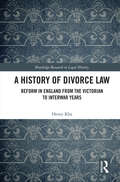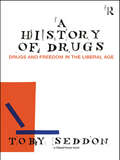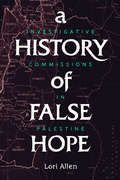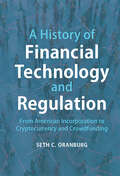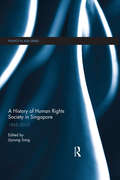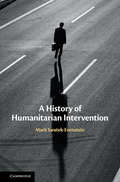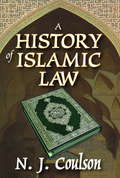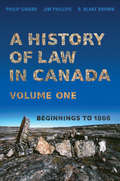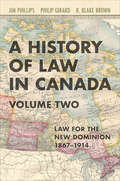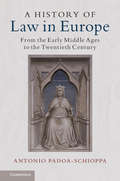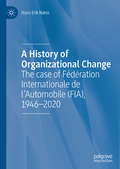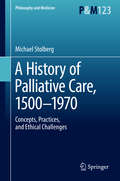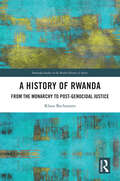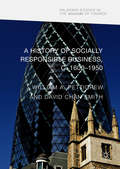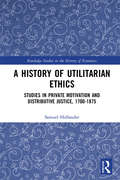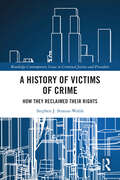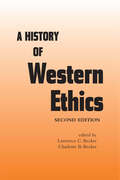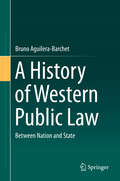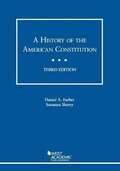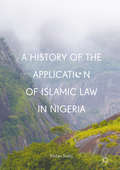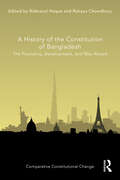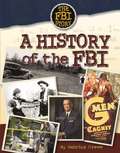- Table View
- List View
A History of Cyber Security Attacks: 1980 to Present
by Bruce MiddletonStories of cyberattacks dominate the headlines. Whether it is theft of massive amounts of personally identifiable information or the latest intrusion of foreign governments in U.S. government and industrial sites, cyberattacks are now important. For professionals and the public, knowing how the attacks are launched and succeed is vital to ensuring cyber security. The book provides a concise summary in a historical context of the major global cyber security attacks since 1980. Each attack covered contains an overview of the incident in layman terms, followed by a technical details section, and culminating in a lessons learned and recommendations section.
A History of Divorce Law: Reform in England from the Victorian to Interwar Years (Routledge Research in Legal History)
by Henry KhaThe book explores the rise of civil divorce in Victorian England, the subsequent operation of a fault system of divorce based solely on the ground of adultery, and the eventual piecemeal repeal of the Victorian-era divorce law during the Interwar years. The legal history of the Matrimonial Causes Act 1857 is at the heart of the book. The Act had a transformative impact on English law and society by introducing a secular judicial system of civil divorce. This swept aside the old system of divorce that was only obtainable from the House of Lords and inadvertently led to the creation of the modern family justice system. The book argues that only through understanding the legal doctrine in its wider cultural, political, religious, and social context is it possible to fully analyse and assess the changes brought about by the Act. The major developments included the end of any pretence of the indissolubility of marriage, the statutory enshrinement of a double standard based on gender in the grounds for divorce, and the growth of divorce acrossall spectrums of English society. The Act was a product of political and legal compromise between conservative forces resisting the legal introduction of civil divorce and the reformers, who demanded married women receive equal access to the grounds of divorce. Changing attitudes towards divorce that began in the Edwardian period led to a gradual rejection of Victorian moral values and the repeal of the Act after 80 years of existence in the Interwar years. The book will be a valuable resource for academics and researchers with an interest in legal history, family law, and Victorian studies.
A History of Drugs: Drugs and Freedom in the Liberal Age
by Toby SeddonWhy are some psychoactive substances regarded as ‘dangerous drugs’, to be controlled by the criminal law within a global prohibition regime, whilst others – from alcohol and tobacco, through to those we call ‘medicines’ – are seen and regulated very differently? A History of Drugs traces a genealogy of the construction and governance of the ‘drug problem’ over the past 200 years, calling into question some of the most fundamental ideas in this field: from ‘addiction’ to the very concept of ‘drugs’. At the heart of the book is the claim that it was with the emergence in the late eighteenth century of modern liberal capitalism, with its distinctive emphasis on freedom, that our concerns about the consumption of some of these substances began to grow. And, indeed, notions of freedom, free will and responsibility remain central to the drug question today. Pursuing an innovative inter-disciplinary approach, A History of Drugs provides an informed and insightful account of the origins of contemporary drug policy. It will be essential reading for students and academics working in law, criminology, sociology, social policy, history and political science.
A History of False Hope: Investigative Commissions in Palestine
by Lori AllenThis book offers a provocative retelling of Palestinian political history through an examination of the international commissions that have investigated political violence and human rights violations. More than twenty commissions have been convened over the last century, yet no significant change has resulted from these inquiries. The findings of the very first, the 1919 King-Crane Commission, were suppressed. The Mitchell Committee, convened in the heat of the Second Intifada, urged Palestinians to listen more sympathetically to the feelings of their occupiers. And factfinders returning from a shell-shocked Gaza Strip in 2008 registered their horror at the scale of the destruction, but Gazans have continued to live under a crippling blockade. Drawing on debates in the press, previously unexamined UN reports, historical archives, and ethnographic research, Lori Allen explores six key investigative commissions over the last century. She highlights how Palestinians' persistent demands for independence have been routinely translated into the numb language of reports and resolutions. These commissions, Allen argues, operating as technologies of liberal global governance, yield no justice—only the oppressive status quo. A History of False Hope issues a biting critique of the captivating allure and cold impotence of international law.
A History of Financial Technology and Regulation: From American Incorporation to Cryptocurrency and Crowdfunding
by Seth C. OranburgUsing the lens of history, A History of Financial Technology and Regulation illuminates recent changes to the world of finance. With lucid prose and the help of concrete examples, Seth Oranburg helps readers understand the role of technology in finance today, including complex phenomena such as mutual funds, cryptocurrencies, and the stock market itself. Chapters begin with basic principles and historical analogy before describing complex digital-investment strategies and instruments. Readers will also gain an introduction to key concepts in financial regulation, learning how law and regulations prevented some financial crises while perpetuating others. Oranburg concludes with ideas about what's next for finance and how the law should respond. This book will appeal to specialists and nonspecialists alike who are interesting in learning more about business, economics, finance, law, and regulation.
A History of Human Rights Society in Singapore: 1965-2015 (Politics in Asia)
by Jiyoung SongTo celebrate Singapore’s fiftieth anniversary for its independence from Malaysia in 2015, 35 students, academics and activists came together to discuss and write about pioneering Singaporean human rights activists and their under-reported stories in Singapore. The city-state is known for its remarkable economic success while having strict laws on individual freedom in the name of national security, public order and racial harmony. Singapore’s tough stance on human rights, however, does not negate the long and persistent existence of a human rights society that is little known to the world until today. This volume, composed of nine distinctive chapters, records a history of human rights activists, their campaigns, main contentions with the government, survival strategies and other untold stories in Singapore’s first 50 years of state-building.
A History of Humanitarian Intervention
by Mark Swatek-EvensteinThe question of 'humanitarian intervention' has been a staple of international law for around 200 years, with a renewed interest in the history of the subject emerging in the last twenty years. This book provides a chronological account of the evolution of the discussion and uncovers the fictional narrative provided by international lawyers to support their conclusions on the subject, from justifications and arguments for 'humanitarian intervention', the misrepresentation of great power involvement in the Greek War of Independence in 1827, to the 'humanitarian intervention that never was', India's war with Pakistan in 1971. Relying on a variety of sources, some of them made available in English for the first time, the book provides an undogmatic, alternative history of the fight for the protection of human rights in international law.
A History of Islamic Law (Islamic Surveys Ser.)
by N. CoulsonLawyers, according to Edmund Burke, are bad historians. He was referring to an unwillingness, rather than an inaptitude, on the part of early nineteenth-century English lawyers to concern themselves with the past: for contemporary jurisprudence was a pure and isolated science wherein law appeared as a body of rules, based upon objective criteria, whose nature and very existence were independent of considerations of time and place. Despite the influence of the historical school of Western jurisprudence, Burke's observation is generally valid for Middle East studies. Muslim jurisprudence in its traditional form provides an extreme example of a legal science divorced from historical considerations. Law, in classical Islamic theory, is the revealed will of God, a divinely ordained system preceding, and not preceded by, the Muslim state controlling, but not controlled by, Muslim society. There can thus be no relativistic notion of the law itself evolving as an historical phenomenon closely tied with the progress of society. The increasing number of nations that are largely Muslim or have a Muslim head of state, emphasizes the growing political importance of the Islamic world, and, as a result, the desirability of extending and expanding the understanding and appreciation of their culture and belief systems. Since history counts for much among Muslims and what happened in 632 or 656 is still a live issue, a journalistic familiarity with present conditions is not enough; there must also be some awareness of how the past has molded the present. This book is designed to give the reader a clear picture. But where there are gaps, obscurities, and differences of opinion, these are also indicated.
A History of Law and Lawyers in the GATT/WTO
by Gabrielle MarceauHow did a treaty that emerged in the aftermath of World War II and barely survived its early years evolve into one of the most influential organizations in international law? This unique book brings together original contributions from an unprecedented number of eminent current and former GATT and WTO staff members--including many current and former Appellate Body members--to trace the history of law and lawyers in the GATT/WTO and explore how the nature of legal work has changed over the institution's sixty-year history. It paints a fascinating portrait of the development of the rule of law in the multilateral trading system and allows some of the most important names in GATT and WTO history to share their stories and reflect on the WTO's remarkable journey from a "provisionally applied treaty" to an international organization defined by its commitment to the rule of law. This volume provides a new perspective on the role of law and lawyers in the GATT/WTO Secretariats that highlights the multiple roles of lawyers and non-lawyers in enhancing the rule of law in the multilateral trading system.
A History of Law in Canada, Vol. 1: Beginnings to 1866 (Osgoode Society for Canadian Legal History #1)
by R. Blake Brown Philip Girard Jim PhillipsThis book is the first of two volumes devoted to the history of law in Canada. This volume begins at a time just prior to European contact and continues to the 1860s, while volume two will start with Confederation and end at approximately 2000. The history of law includes substantive law, legal institutions, legal actors and legal culture. The book assumes that since 1500 there have been three legal systems in Canada – the Indigenous, the French, and the English. At all times, these systems have co-existed and interacted, with the relative power and influence of each being more or less dominant in different periods. The history of law cannot be treated in isolation, and this book examines law as a dynamic process, shaped by and affecting other histories over the long term. The law guided and was guided by economic developments, was influenced and moulded by the nature and trajectory of political ideas and institutions, and variously exacerbated and mediated by inter-cultural exchange and conflict. These themes are apparent in this examination, and through most areas of law including family law, constitutional, commercial, land settlement and tenure, and criminal.
A History of Law in Canada, Volume Two: Law for a New Dominion, 1867–1914 (Osgoode Society for Canadian Legal History)
by R. Blake Brown Philip Girard Jim PhillipsThis is the second of three volumes in an important collection that recounts the sweeping history of law in Canada. The period covered in this volume witnessed both continuity and change in the relationships among law, society, Indigenous peoples, and white settlers. The authors explore how law was as important to the building of a new urban industrial nation as it had been to the establishment of colonies of agricultural settlement and resource exploitation. The book addresses the most important developments in the seventeenth, eighteenth, and nineteenth centuries, including legal pluralism and the co-existence of European and Indigenous law. It pays particular attention to the Métis and the Red River Resistance, the Indian Act, and the origins and expansion of residential schools in Canada. The book is divided into four parts: the law and legal institutions; Indigenous peoples and Dominion law; capital, labour, and criminal justice; and those less favoured by the law. A History of Law in Canada examines law as a dynamic process, shaped by and affecting other histories over the long term.
A History of Law in Europe: From the Early Middle Ages to the Twentieth Century
by Antonio Padoa-SchioppaWith its roots in ancient Greece, Roman law and Christianity, European legal history is the history of a common civilisation. The exchange of legislative models, doctrines and customs within Europe included English common law and has been extensive from the early middle ages to the present time. In this seminal work which spans from the fifth to the twentieth century, Antonio Padoa-Schioppa explores how law was brought to life in the six main phases of European legal history. By analysing a selection of the institutions of private and public law which are most representative of each phase and of each country, he also sheds light on the common features throughout the history of European legal culture. Translated in English for the first time, this new edition has been revised to include the recent developments of the European Union and the legal-historical works of the last decade.
A History of Organizational Change: The case of Fédération Internationale de l’Automobile (FIA), 1946–2020
by Hans Erik NæssThis book is the first independent exploration of the Fédération Internationale de l’Automobile’s (FIA) institutional history. Virtually unexamined compared with similar institutions like the FIFA and the IOC, the FIA has nevertheless changed from being a small association in 1904 to becoming one of the world’s most influential sport governing bodies. Through chronologically organised chapters, this book explains how the FIA manages to link together motorsport circuses like Formula 1 with the automotive industry and societal issues like road safety and environmental sustainability. In an exciting narrative spanning seven decades, it reviews the FIA’s organisational turning points, governing controversies, political dramas and sporting tragedies. Considering the FIA to be a unique type of hybrid organisation characterised by what the author calls ‘organisational emulsion’, this case study contains theoretical innovations relevant to other studies of sport governing bodies. It makes an empirically grounded contribution to the research fields of institutional logics, historical sociology and sport governance.
A History of Palliative Care, 1500-1970: Concepts, Practices, and Ethical challenges (Philosophy and Medicine #123)
by Michael StolbergThis book on the history of palliative care, 1500-1970 traces the historical roots of modern palliative care in Europe to the rise of the hospice movement in the 1960s. The author discusses largely forgotten premodern concepts like cura palliativa and euthanasia medica and describes, how patients and physicians experienced and dealt with terminal illness. He traces the origins of hospitals for incurable and dying patients and follows the long history of ethical debates on issues like truth-telling and the intentional shortening of the dying patients' lives and the controversies they sparked between physicians and patients. An eye opener for anyone interested in the history of ethical decision making regarding terminal care of critically ill patients.
A History of Rwanda: From the Monarchy to Post-genocidal Justice (Routledge Studies in the Modern History of Africa)
by Klaus BachmannA History of Rwanda: From the Monarchy to Post-genocidal Justice provides a complete history of Rwanda, from the precolonial abanyiginya kingdom, through the German and Belgian colonial periods and subsequent independence, and then the devastating 1994 genocide and reconstruction, right up to the modern day. Based on extensive archival research, this book provides new insights and corrects many popular stereotypes about Rwanda, aiming to go beyond the polarized and heated debates focused on the genocide and the events that followed. Readers will get a clear and broad picture of Rwanda’s history and the social and political contexts that have defined the county from the pre-colonial period onwards. Embedding Rwanda’s history in the regional context, this book avoids simple moral judgements and instead shows where and when Rwanda differed from its neighbours and how the country’s history fits into larger debates about colonialism, genocide, ethnicity, race and development. Offering a full and balanced exploration of Rwanda’s rich and paradoxical history, this book will be an important read for researchers and students of African history, genocide studies, transitional justice, colonialism, and political and social anthropology.
A History of Socially Responsible Business, c.1600–1950
by David Chan Smith William A PettigrewThis book examines the changing reciprocal relationships between corporations and their various social obligations over the very long term - from the seventeenth to the twentieth century. Chapters from emerging and established business historians assess the full range of social obligations that corporations held historically. By adopting an innovative methodological approach that is long-term and comparative, this book offers a challenge to the literature on corporate history and will be of interest to researchers and academics in the field of finance and business history.
A History of Tort Law 1900-1950
by Paul MitchellMany of the defining features of the modern law of tort can be traced to the first half of the twentieth century, but, until now, developments in that period have never received a dedicated historical examination. This book examines both common law and statutory innovations, paying special attention to underlying assumptions about the operation of society, the function of tort law, and the roles of those involved in legal changes. It recovers the legal and social contexts in which some landmark decisions were given (and which puts those decisions in a very different light) and draws attention to significant and suggestive cases that have fallen into neglect. It also explores the theoretical debates of the period about the nature of tort law, and reveals the fascinating patterns of influence and power at work behind statutory initiatives to reform the law.
A History of Utilitarian Ethics: Studies in Private Motivation and Distributive Justice, 1700-1875 (Routledge Studies in the History of Economics)
by Samuel HollanderIn this landmark volume, Samuel Hollander presents a fresh and compelling history of moral philosophy from Locke to John Stuart Mill, showing that a ‘moral sense’ can actually be considered compatible with utilitarianism. The book also explores the link between utilitarianism and distributive justice. Hollander engages in close textual exegesis of the works relating to individual authors, while never losing sight of the intellectual relationships between them. Tying together the greatest of the British moral philosophers, this volume reveals an unexpected unity of eighteenth and nineteenth century ethical doctrine at both the individual and social level. Essential reading for advanced students and researchers of the history of economic thought, political economy, history of ethics, history of political thought and intellectual history.
A History of Victims of Crime: How they Reclaimed their Rights (Routledge Contemporary Issues in Criminal Justice and Procedure)
by Stephen J. Strauss-WalshThis book examines the evolution of the contemporary crime victim’s procedural place within modern Western societies. Taking the history of the Irish crime victim as a case study, the work charts the place of victims within criminal justice over time. This evolves from the expansive latitude that they had during the eighteenth century, to their major relegation to witness and informer in the nineteenth, and back to a more contemporary recapturing of some of their previous centrality. The book also studies what this has meant for the position of suspects and offenders as well as the population more generally. Therefore, some analysis is devoted to examining its impact on an offender’s right to fair trial and social forms. It is held that the modern crime victim has transcended its position of marginality. This happened not only in law, but as the consequence of the victim’s new role as a key sociopolitical stakeholder. This work flags the importance of victim rights conferrals, and the social transformations that engendered such trends. In this way victim re-emergence is evidenced as being not just a legal change, but a consequence of several more recent sociocultural transformations in our societies. The book will be of interest to researchers, academics, and policy makers in criminal law, human rights law, criminology, and legal history.
A History of Western Ethics
by Lawrence C. Becker Charlotte B. BeckerThis newly revised and updated edition of A History of Western Ethics is a coherent and accessible overview of the most important figures and influential ideas of the history of ethics in the Western philosophical tradition.
A History of Western Public Law: Between Nation and State
by Bruno Aguilera-BarchetThe book outlines the historical development of Public Law and the state from ancient times to the modern day, offering an account of relevant events in parallel with a general historical background, establishing and explaining the relationships between political, religious, and economic events.
A History of the American Constitution
by Suzanna Sherry Daniel FarberThe third edition brings the material up-to-date with both the latest historical scholarship and the most recent Supreme Court decisions using historical analysis. Among both judges and academics, one of the hottest issues in constitutional law is the role of "original intent." Almost everyone agrees that it is important, and some scholars and judges believe it should be the most important factor in constitutional law. To think about these issues intelligently, law students need to have ready access to the historical materials so they can see how the Framers of the Constitution thought about critical issues. Yet the original source materials fill many volumes. Writings by historians also fill many bookshelves. Just as the traditional casebook selects and condenses materials from the court reports to make them useful for law students, this book does the same thing for the historical evidence of original intent. There is no other source that covers this range of materials, combined with concise overviews of the best understanding of the historical context. Only this book gives students a cogent introduction to the history behind the Constitution and its major amendments, so they can form their own judgments about the "original understanding" and its relevance to modern constitutional law.
A History of the Application of Islamic Law in Nigeria
by Yushau SodiqThis work analyzes the history of the application of Islamic law (Shari`ah) in Nigeria. It analyzes how Islamic law emerged in Nigeria toward the beginning of the 19th century and remained applicable until the arrival of the British Colonial regime in Northern Nigeria in 1903. It sheds light on how the law survived colonial rule and continues until today. Dr. Yushau Sodiq analyzes progressive elements in Islamic law over the past two centuries. He goes on to discuss many objections raised by the Nigerian Christians against the application of Islamic law, as well as how Muslims respond to such criticism. In a world that is often saturated with Islamophobia and ignorant misconceptions about Islam, this book aims to clarify and respond to many important concepts and ideas within Islamic religious tradition.
A History of the Constitution of Bangladesh: The Founding, Development, and Way Ahead (Comparative Constitutional Change)
by Ridwanul Hoque Rokeya ChowdhuryMarking the 50th anniversary of Bangladesh's Constitution, this book gauges its development from 1972 to 2022, focusing on its foundational goals, performances, and current challenges. The collection, presenting diverse but issue-specific chapters, shows how the people, political parties and leaders, and constitutional and legal institutions interact with each other in advancing, breaking, and remaking their Constitution. It examines the local context, parliamentary history, and interpretive tools adopted by the Supreme Court in understanding the Constitution as well as the future prospect of constitutional politics and practices. The work brings together legal professionals and constitutional law scholars to encapsulate the panorama of the country’s constitutional evolution. The authors look back to the history of constitution-making, to reflect critically on the present in light of the founding goals, spirits, and aspirations and with a view to offering a forward-looking and resilient vision of constitutionalism in Bangladesh. The book will be of interest to researchers, academics, and policy-makers working in the areas of comparative constitutional law and politics and South Asian Studies.
A History of the FBI
by Sabrina CreweThe Federal Bureau of Investigation (FBI) is a national agency dedicated to investigation federal crimes. Founded as a small team of special agents on July 26, 1908, the Bureau was first charged with enforcing the growing body of federal laws covering the United States as a whole. Almost from the beginning of its 100-year history, the Bureau has been the subject of legend and controversy. It has also evolved into a vast and sophisticated national law-enforcement agency. Whether as a federal crime-fighting force or a source of investigative support of local and state police forces, the modern FBI strives to embody its ideals of fidelity, bravery, and integrity. The story of the FBI is really the story of the United States as it changed through the 20th century and into the 21st. As the nation grew, both in size and wealth, the Bureau's powers grew with it. Two world wars brought new demands on the FBI to protect Americans. From the gangster era and crime networks, through political scandals and civil rights, to cyber-crime and terrorism-this book shows how the FBI has played a role in U.S. history for 100 colorful years.

